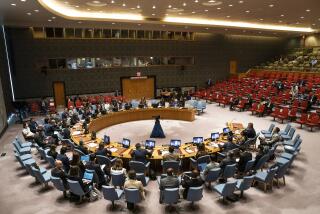Russian Oil Worries Send Prices to a Record High
- Share via
Crude oil prices soared to record levels Wednesday after Russia’s largest oil exporting company said it might have to halt production, jolting markets already fearful about the stability of global supplies.
The benchmark U.S. grade of crude shot up $1.06 to $42.90 a barrel, the most it has commanded since oil began trading on the New York Mercantile Exchange 21 years ago. Gasoline also climbed, charting its biggest gain in three weeks.
“If we keep crude oil prices above $42 or $43 a barrel, it will filter down to the gas pumps pretty quickly,” said Phil Flynn, senior energy analyst at Alaron Trading Corp. in Chicago.
In California, pump prices have fallen for eight straight weeks, to an average $2.162 for a gallon of self-serve regular, and a few Southern California stations are selling gasoline for less than $2 a gallon.
“That could change in a matter of days,” Flynn said.
Oil markets have been particularly nervous this year. Analysts figure that about $10 of the per-barrel price is what they call the “risk premium,” which reflects worries that terrorism or political unrest will interrupt the flow of oil at a time that demand is on the rise.
The surge Wednesday was sparked by concern about exports from Yukos, which produces about 1.7 million barrels a day. Yukos said Russian court bailiffs, enforcing a $3.4-billion tax judgment, had ordered it to halt “property sales” at three key production facilities.
“Does that mean we cannot sell oil? We don’t know,” Yukos spokesman Hugo Erikssen said. “We have asked for clarification, and we expect to get it tomorrow.”
Russia is the second-biggest exporter of oil after Saudi Arabia, the leading member of the Organization of the Petroleum Exporting Countries. The cartel pumps about one-third of the world’s oil; it is now producing about 30 million barrels daily, its highest level since 1979.
Despite output increases this year by OPEC, oil supplies are stretched. Demand is mounting worldwide, especially in the U.S., which consumes one-quarter of the world’s oil, and China, the second-largest market.
OPEC is set to raise its daily production ceiling by 500,000 barrels, or about 1.5%, starting Sunday and is believed to have little capacity to boost output to make up for the loss of Yukos’ yield.
On Wednesday, the Los Angeles-area gasoline market was unaffected by crude oil’s rally. The spot wholesale price for regular gasoline was little changed at $1.38 to $1.39 a gallon, said Mary Welge, senior editor at the Oil Price Information Service, which tracks fuel markets. Dealers add transportation costs, taxes and any profit to the wholesale price to establish the retail price paid by motorists.
A buildup of stockpiles in the region for two weeks kept pump prices from moving up, said Bob Van der Valk, bulk fuels manager at Cosby Oil Co. in Santa Fe Springs. But he said that if crude remained higher than $42, “it could stop the downward slide” at the retail level.
Wednesday’s close on Nymex broke the record set June 1, when crude closed at $42.33. Gasoline futures prices, which reflect national wholesale prices, remained below record highs reached in May, climbing 5.1 cents, or 4%, to $1.295 a gallon.
Oil remains well below record levels when adjusted for inflation. In 1979 and 1980, after the revolution in oil-rich Iran, a 42-gallon barrel sold for $30 to $35, which is equivalent to $70 to $80 in today’s dollars.
Some analysts contend that traders’ fears are overblown relative to the fundamentals of the market, where they see supplies remaining ample to satisfy the global thirst for oil.
On Wednesday, for instance, U.S. government figures showed that U.S. oil supplies last week rose 1.2 million barrels from the week before to 300.5 million, and were up 17.3 million barrels, or 6%, from a year earlier.
But the Yukos news was viewed as bigger. The company has warned that it could become insolvent by mid-August if Moscow fails to lift a court-ordered freeze on its assets, which it needs to conduct operations.
The Russian government has been pushing forward with a plan to sell Yuganskneftegaz, Yukos’ main production unit, to cover the tax bill -- a course most analysts view as an attempt by the state to dismantle and possibly take over the company, which produces 2% of the world’s oil.
Yukos exports primarily to China, Eastern Europe and the former Soviet Baltic republics.
Peltz reported from Los Angeles and Murphy from Moscow.
More to Read
Inside the business of entertainment
The Wide Shot brings you news, analysis and insights on everything from streaming wars to production — and what it all means for the future.
You may occasionally receive promotional content from the Los Angeles Times.











